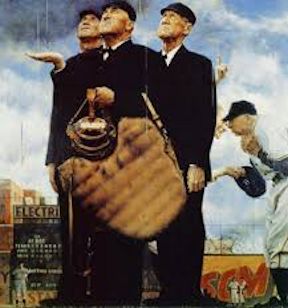 Spectator Interference
Spectator Interference
Specator interference occurs when any person not affiliated with the game in progress (player, coach, or umpire) impedes in any way the conduct of the game on the field of play. Spectator interference is spelled out in Definitions (interference(d)):
6.01(e) describes how the umpire should handle spectator interference. As you might expect, the ball is immediately dead. Then, "the umpire shall impose such penalties as in the umpire's opinion will nullify the act of interference."
This could (but will not necessarily) result in calling a batter out. An "approved ruling" on 6.01(e) stipulates that "If a spectator clearly prevents a fielder from catching a fly ball, the umpire shall declare the batter out."
Most commonly, it's the defense, not the offense, that is disadvantaged by spectator interference, typically when a fan reaches out over the field to catch or touch a live ball. In this situation, the umpire should place the runner at a base that, in his judgment, the runner would have achieved had the spectator interference not occurred.
Here are a few more important points about spectator interference that you'll find in a lengthy comment on 6.01(e):
- If a ball is hit into a spectator area (out of play), then bounces back into the field of play, this is not specatator interference, but simply a dead ball out of play.
- Any person reaching out of the stands or otherwise over the field of play is intentionally interfering, as described in 6.01(e); batter and runners shall be placed as per umpire's judgment to nullify the interference.
- However, if it is the fielder who "reaches over a fence, railing, rope or into a stand to catch a ball," there shall be no interference. While a fielder is allowed to reach into dead ball territory to make a catch, he does so at his peril because if he is impeded by actions of spectators over dead ball territory, he's out of luck.
- If, on the other hand, a spectator reaches out of the stands (rope, railing, etc.) into live ball territory and prevents a fielder from catching a fly ball, "the batsman should be called out for spectator's interference."

